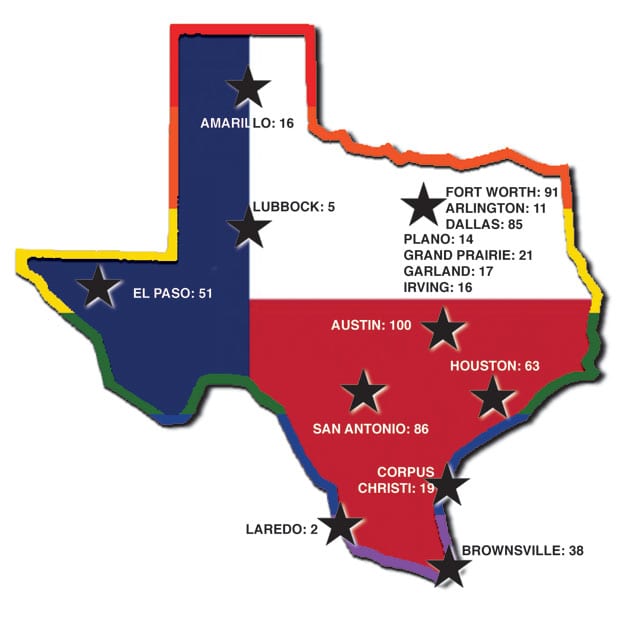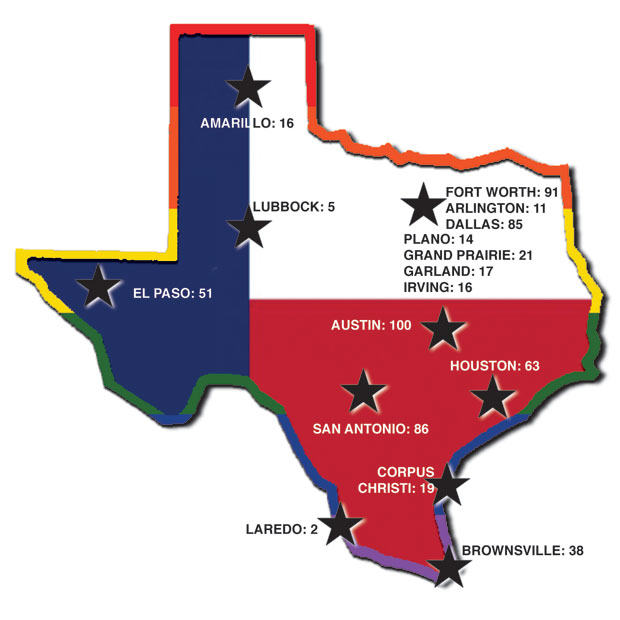Survey identifies various strengths and deficiencies in 16 Texas cities’ approach to LGBT equality issues
While many people still view Dallas as the most LGBT-friendly city in the Metroplex, Fort Worth still outranks the city on the Human Rights Campaign’s 2013 Municipal Equality Index released this week.
The report surveys LGBT-inclusive city policies and practices over the course of a year.
Fort Worth — which ranked higher than Dallas last year in the report’s first year — jumped 2 points this year, bringing it to 91, for equivalent family leave, which was left off last year.
Dallas, however, saw a 9-point increase for items the city didn’t receive credit for last year, bringing its score from a 76 last year to an 85. But HRC originally gave Dallas a 78 on an initial draft.
Pam Gerber, a member of the city’s LGBT Task Force, said a committee formed after the draft came back with a 78 score. Its goal was to evaluate ways in which the city could improve its score with a goal of a 10 percent increase. The committee included people from the city manager’s office and throughout City Hall.
“This was not just a gay endeavor. This was a city endeavor,” she said. “We put together a team of people and made a very compelling argument to up that score.”
Several things over the past year seemed to contribute to the likelihood of a lower score for Dallas this year after a failed equality resolution at City Hall that was blocked by the mayor.
Councilman Scott Griggs’ resolution, which aimed to show the City Council’s support for marriage equality and statewide job protections for LGBT people, failed to go before the council for a June vote because former Councilwoman Delia Jasso pulled her support from a petition requiring a vote. Former Mayor Pro Tem Pauline Medrano then tried to get the resolution on the agenda last minute as acting mayor since Mayor Mike Rawlings was out of the country on business. But Rawlings intervened form abroad to block the item from moving forward.
Dallas’ increase came from various things left off from last year and a few bonus points. The city’s contractor equal benefits ordinance was added this year, in addition to the city receiving bonus points for providing services to LGBT seniors and youth. McDonnell said the city’s Office of Cultural Affairs gives money to the Women’s Chorus of Dallas and the Turtle Creek Chorale.
As for the relationship with the LGBT community, Dallas earned 3 points for leadership’s public position on LGBT equality, compared to 2 points last year. It also gained 2 points for leadership’s pro-equality legislative or policy efforts, which brought the city zero points last year.
Gerber said having the score accurately reflect the city’s efforts was important because “we’re using it as a tool to improve services to the LGBT community.”
Resource Center spokesman Rafael McDonnell said Dallas’ score is at its highest unless the city does something more, like add equivalent family leave or comprehensive transgender healthcare coverage for city employees or change the public’s perception of leadership’s views.
“We didn’t do anything new, but we got credit for stuff we have been doing,” McDonnell said. “An 85 should be looked at as our ceiling until we do something better. If we want to grow the score next year, we’re going to have to do some things.”
He said the scores from this year’s index set the standard among suburban cities for the years to come and the work for LGBT advocates.
“This sets a benchmark for some of the suburban cities,” McDonnell said. “The big takeaway is that equality doesn’t stop at a city line. The fight for it stretches across city lines.”
The new report ranked 16 Texas cities, compared to seven last year. Dallas, Fort Worth, El Paso, Houston and San Antonio saw a score increase, while Arlington saw a 5-point decrease. But the big surprises came with the number of suburban cities like Plano, Garland and Grand Prairie that were ranked.
LGBT advocates said this week the scores of those cities show the impact years of advocacy has produced.
McDonnell said what impressed him was Grand Prairie’s score of 21. He said the city’s leaders quietly adopted a nondiscrimination policy for city employees in 2008 that includes sexual orientation and later implemented Dallas
Independent School District’s LGBT-inclusive anti-bullying policy in 2011. The city also received credit for reporting hate crime statistics to the FBI.
“It shows that the quest for equality isn’t just a city of Dallas or a county or quasi-governmental issue,” he said. “There’s a lot of work that’s available to be done throughout the area.”
David Mack Henderson, president of Fairness Fort Worth, said Grand Prairie’s progress was “enlightening”, and he hoped the city would continue to add protections for its LGBT employees and citizens.
“What happened with Grand Prairie speaks to the proof for all the hard work LGBT advocates have done for years,” Henderson said. “Sometimes good things happen, and we find out after the fact.”
Arlington lost 5 points, bringing it to a score of 11, for not protecting against discrimination based on sexual orientation in city employment, which it was credited for last year. While sexual orientation is listed among the diversity the city values on the city’s workforce services webpage, the city’s Equal Employment Opportunity Policy doesn’t include sexual orientation.
Henderson said despite the policy not officially covering LGBT employees, Arlington leaders are still striving toward equal protections.
“Arlington is working very hard to be an inclusive city, and I think they’re making inroads to do that,” Henderson said.
Garland scored a 17 for having a Human Rights Commission and reporting hate crimes. LGBT advocates recently attended a Garland City Council meeting and worked with area residents to try to encourage the council to pass a citywide nondiscrimination ordinance. The push for the ordinance came after a Garland Dallas Area Rapid Transit appointee, who is appointed by the City Council, voted against adding domestic partner benefits for the transit agency earlier this year.
Irving received 16 points for hate crime reporting and for the county protecting sexual orientation and gender identity. But Dallas County doesn’t have a countywide nondiscrimination policy, just one for the county’s employees.
In Collin County, Plano brought in a 14, with 10 for reporting hate crimes, 2 points for the city’s engagement with the LGBT community and 2 points for city leadership’s public position on LGBT equality.
Former Plano Mayor Phil Dyer was an honorary co-chair of North Texas Pride earlier this year. Current Mayor Harry LaRosiliere has long supported the LGBT advocacy group Collin County Gay and Lesbian Alliance, now GALA NTX, and considers himself an ally.
Jeanne Rubin, vice president of Gay and Lesbian Alliance of North Texas, said the work began in Plano more than 10 years ago with the organization, of which many members were from Plano.
“Just the fact that it’s even included is a step forward,” she said. “It speaks to the fact that there are so many LGBT people in the DFW suburbs that we’re making a difference even if it’s just because we’re becoming more visible and people know that we’re here.”
Rubin said she expects other DFW suburbs to be included in future years, spurring more advocacy and change.
“I think we should keep an eye on North Texas because obviously change is coming to the whole state, but I think North
Texas is a good barometer to watch,” Rubin said.
The report ranked 291 U.S. cities this year, compared to 137 cities in the first-ever survey last year. The cities included state capitals, each states’ three largest cities, cities with the largest public university and 75 cities with high proportions of same-sex couples.
Cities were evaluated for equality policies and practices on 47 criteria in five categories of nondiscrimination laws, relationship recognition, city employee benefits, city services, law enforcement and relationship with the LGBT community.
Bonus points were again offered in most sections, but cities could receive only a maximum score of 100.
Cathryn Oakley, the primary author of the MEI, said Texas’ scores showed improvement and were impressive overall.
“I think a lot of cities have good intentions, and they may feel much more inclusive than their score reflects,” she said. “What we’re rating are the cities’ laws and polices, which are objective.”
With such a big state and so many cities rated, Oakley said the response from cities was important, some of which pointed out things to help improve their scores, showing how seriously they took the report last year.
“It’s great to be able to point out cities that are doing important things for the LGBT community,” she said.
Outside the Metroplex, San Antonio received an 86 score, jumping from a 48 score last year, despite the controversy this summer over a nondiscrimination ordinance.
Austin, which received a 91 last year, was the only score to reach a 100 this year. It gained points for mayoral and police LGBT liaisons.
Other cities and their scores included: Houston, 63; El Paso: 51; Brownsville, 38; Corpus Christi, 19; Amarillo, 16; Lubbock, 5; and Laredo, 2.
For more info about the 2013 MEI, visit TinyURL.com/2013MEI.
This article appeared in the Dallas Voice print edition November 22, 2013.


